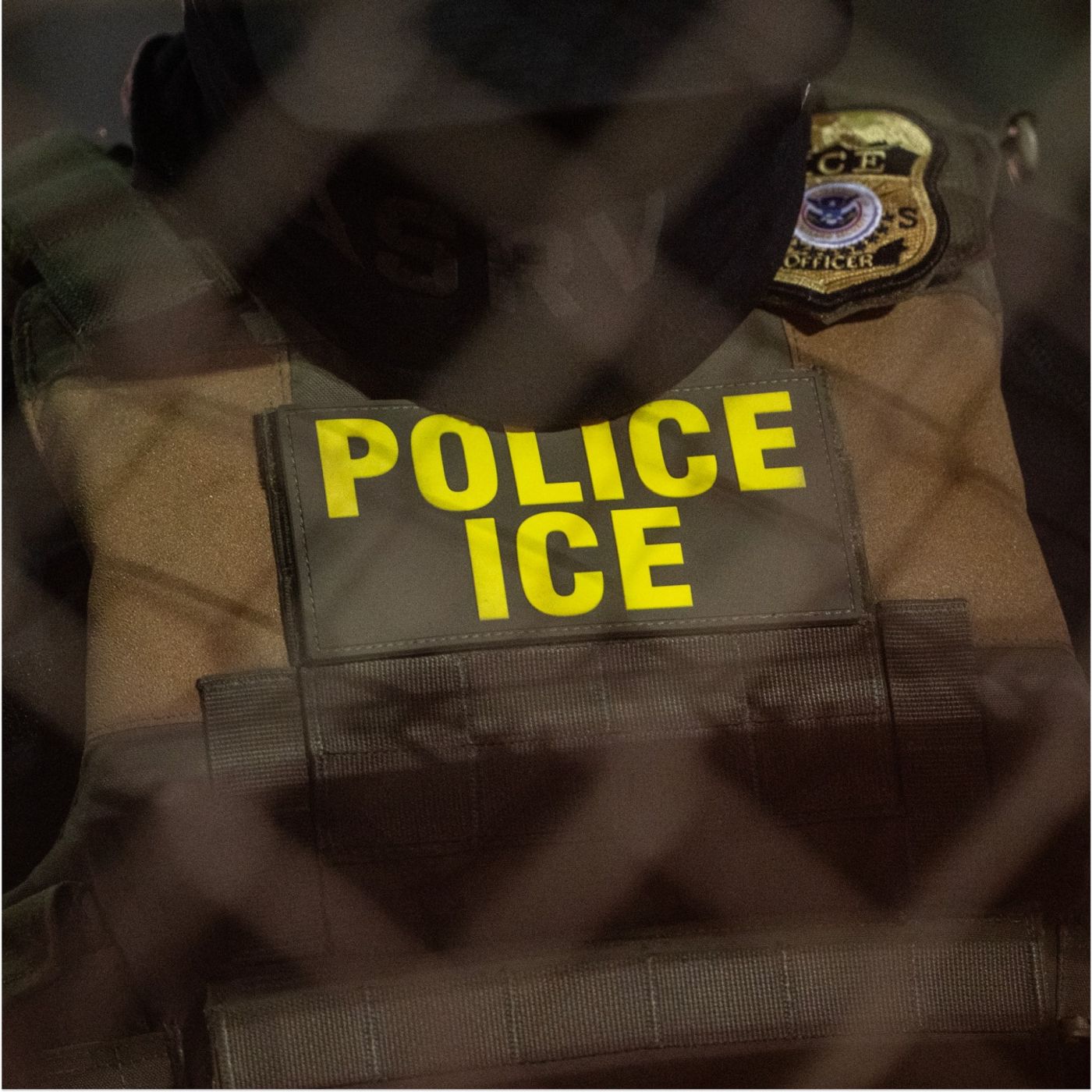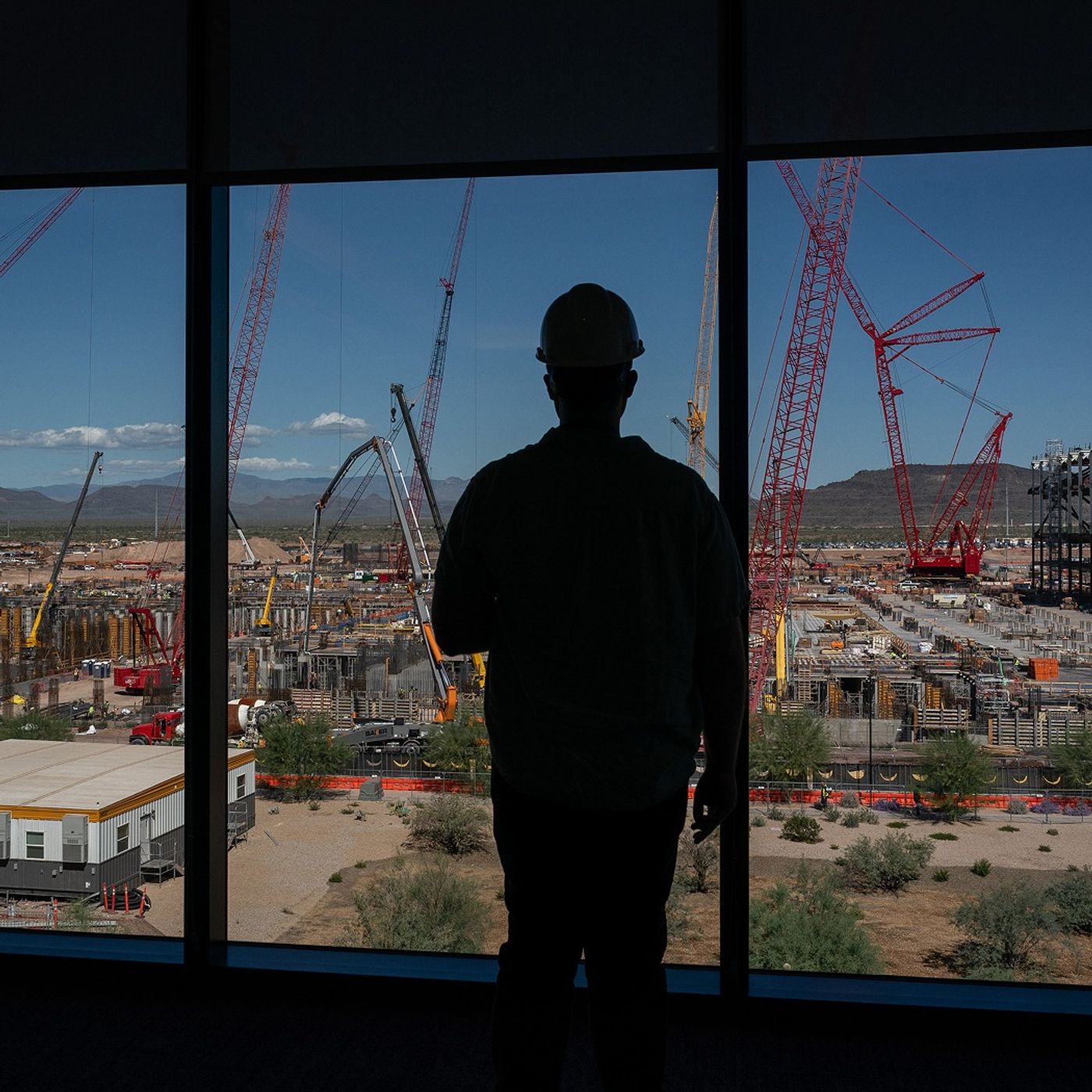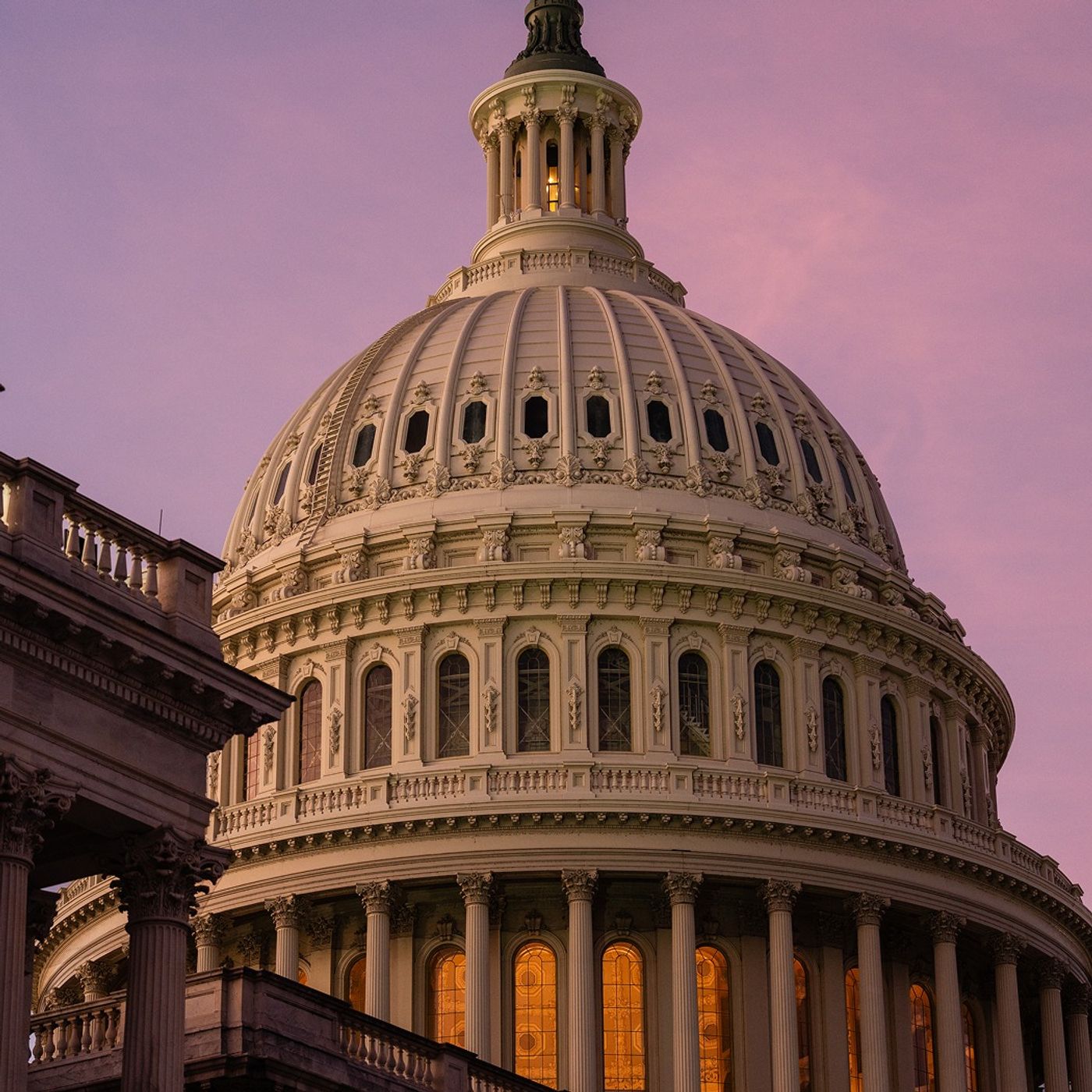Trump Said Family Separations Would End. They’re Happening Again.
Hamed Aleaziz, who covers immigration policy for The Times, has found that in Mr. Trump’s second term, the practice has returned.
Press play and read along
Transcript
Speaker 1 Brought to you by the Capital One Saver Card. With Saver, you earn unlimited 3% cash back on dining, entertainment, and at grocery stores.
Speaker 1 That's unlimited cash back on ordering takeout from home or unlimited cash back on tickets to concerts and games. So grab a bite, grab a seat, and earn unlimited 3% cash back with the Saver card.
Speaker 1
Capital One. What's in your wallet? Terms apply.
See capitalone.com for details.
Speaker 2 From the New York Times, I'm Michael Barbaro.
Speaker 4 This is the Daily.
Speaker 6 During President Trump's first term, the intentional separation of migrant children from their parents shocked the country and persuaded Trump to say that he would end the practice for good.
Speaker 5 But my colleague, Hamid Ali Aziz, has found that in Trump's second term, family separations are back.
Speaker 7 It's Thursday, August 7th.
Speaker 7 Hi, this is the New York Times.
Speaker 9 Yes.
Speaker 7 Yes.
Speaker 5 I'm here with the survey that you requested, sir.
Speaker 7 Okay, fantastic. Let me get my translator on the call.
Speaker 10 Hamid, I wonder if you can tell us about this family that you have been talking to.
Speaker 7 Yeah, I've been speaking with this Russian couple, Evgenia and Evgeny,
Speaker 7 for the past month. Okay, are you here? Is everybody here?
Speaker 8 Yeah.
Speaker 8 Hello.
Speaker 11 Okay, wonderful.
Speaker 7
They're in their 30s. They're from the Russian city of Volgograd.
And they have this eight-year-old child, Maxim.
Speaker 7 I guess I'd like to start, you know,
Speaker 7 why did you want to come to America?
Speaker 7 And Evgeny and Evgenia walk me through their family's journey.
Speaker 7 They fled Russia because of their political activism. They were supporters of Alexei Navalny.
Speaker 11 We were on their watch list and that made it impossible to stay in our country.
Speaker 7 And they went to Mexico.
Speaker 11 There was a program in place which was called CBP1 and we were waiting for about 10 months while in Mexico.
Speaker 7 And their desire was to get an appointment through this app that the Biden administration had created, which allowed people to come to a port of entry, enter the United States, and seek asylum within the country.
Speaker 10 Right. And I'm guessing, based on what you said, that they were seeking political asylum based on this adversarial relationship they had with the Putin government.
Speaker 7 Definitely. They say they were fleeing for their lives.
Speaker 7 But while they're waiting, President Trump is elected and he closes down CBP1.
Speaker 7 And on January 20th, it's gone.
Speaker 10 So, what happens to them with this app gone?
Speaker 7 So they realize that there's no way to enter the United States in the way that they had imagined. So they get inside of a car with two other Russian families and they go to a port of entry.
Speaker 11 We immediately informed that all of the people who were in the car are seeking to apply for the political asylum.
Speaker 7 And says they're there to seek asylum.
Speaker 7 But because the Trump administration has shut down asylum at the southern border wholly and completely, those options are not available to them and they are detained in border patrol custody.
Speaker 10 So every attempt that they've made to enter the country legally has failed, and now they are in the U.S., in the eyes of the Trump administration, illegally.
Speaker 7 Yeah, they're ordered deported very quickly, and the government wants to enforce this deportation order and get them out of the country.
Speaker 8 Got it.
Speaker 10 So, what happens once that deportation order is issued?
Speaker 7 Afghania says that in mid-May,
Speaker 7 after they had already spent two weeks in Border Patrol custody, they were taken from Border Patrol detention to JFK airport.
Speaker 11 And then the following day, they were trying to deport us.
Speaker 7 And it's there where Evgenia and Evgeny realize that they are being deported to Russia, which is something that,
Speaker 7 in their eyes, is just impossible. It's something that cannot happen because of the fear and the threats that they face back in Russia.
Speaker 7 So you have this situation where, in Afghania's eyes, when she's in JFK airport, she's nervous, she's fearful of what deportation means back to her home country,
Speaker 7 and she sees her husband pleading with the ICE officials to stop their deportation.
Speaker 11 We very reasonably explained our position and explained that we're not going to fly anywhere.
Speaker 12 Right, potentially it's life or death for them.
Speaker 7
Exactly. Yeah, it is life or death for them.
And it's at this point inside the airport where they are first told of this idea
Speaker 7 that since they're refusing their deportation, they will be separated from their eight-year-old boy, Maxim, who will go into government custody.
Speaker 10 Just explain that.
Speaker 2 What exactly are they being told, and what rationale is being given?
Speaker 7 Yeah, so they're taken to a room inside JFK,
Speaker 7 and it's there where Evgenia
Speaker 7 believes that since they've refused this deportation, they're going to be separated from their child for a day or two.
Speaker 7 But you have these really intense scenes.
Speaker 11 Well, at first I was actually holding up pretty well, but then I started to cry. And when I started to cry, he picked up and he started to cry too.
Speaker 7
Maxim is looking at his parents. He's confirming with them that it'll only take a few days.
At one point, Evgenia says that her last image of her son is
Speaker 7 her crying and being told to leave this room and her looking back at her son and seeing that he was also crying, but he had kind of faced his head in a different direction.
Speaker 7 And that was the lasting image that she still has in her mind of the last time that she saw her son.
Speaker 7 And from there, Maxim is taken to HHS custody, where he's taken to a child's shelter, and the parents are taken to ICE detention.
Speaker 10 Well, what happened to what they understood to be a very short-term separation?
Speaker 7
It wasn't short-term. It continues.
The separation continues. And in the days and weeks after their initial separation, Evgenia is talking to Maxime on the phone.
Speaker 11 He said that he's sleeping in the same room with children who don't speak English and they don't speak Russian, and he doesn't understand them at all.
Speaker 7 He's in a shelter for unaccompanied immigrant children, and she recalls how it was difficult to actually have this conversation with their son because he was crying so much.
Speaker 7 He was just relentlessly crying.
Speaker 7 Maxim is asking his mother,
Speaker 7 when are you getting me out of here?
Speaker 7 You know, when are you going to come and get me?
Speaker 11 He said, Mama, when are you going to take me out of here?
Speaker 7 And his mother says,
Speaker 7 We're working on it, we'll make it happen.
Speaker 11 I was trying to explain to him that we're trying, we're trying to do that, we're talking to the officers, we're trying to convince them.
Speaker 7 But of course, she she knows she has no understanding whether that's realistic.
Speaker 9 Well, what is she being told?
Speaker 10 What are the border immigration officials telling her and her husband about her son and whether they're going to be reunited?
Speaker 7 Nothing. They have no sense of whether or not they'll be reunified with their child.
Speaker 7 Their attorney actually had requested from the Trump administration to detain the family together in an ICE detention center in Texas, but that request was not granted.
Speaker 10 So, Haman, what exactly do you come to understand has happened to this family and why they end up in this pretty tortured state of
Speaker 10 limbo and quite obviously separation?
Speaker 2 These parents are no longer with their quite young son.
Speaker 7 Well, what I came to understand through weeks of investigation,
Speaker 7 combing through case files and internal documents, was that this family was the face of family separation in this new form during the second Trump administration.
Speaker 9 We'll be right back.
Speaker 13 It's the most hosted show in late night. And it's a good thing, too, because in these uncertain times, one thing is for certain.
Speaker 14 This much news needs this many hosts comedy central's the daily show new weeknights at 11 on comedy central and streaming next day on paramount plus every vitamix blender has a story i have a friend who's a big cook every time i go to her house she's making something different with her vitamix and i was like i need that to make your perfect smoothie in the morning or to make your base for a minestra verde or potato leek soup i can make things with it that i wouldn't be able to make with a regular blender because it does the job of multiple appliances and it actually has a sleekness to it that I like.
Speaker 13
Essential by design, built to last. Go to Vitamix.com to learn more.
That's Vitamix.com.
Speaker 16 The New York Times app has all this stuff that you may not have seen.
Speaker 17 The way the tabs are at the top with all of the different sections.
Speaker 16 I can immediately navigate to something that matches what I'm feeling.
Speaker 10 I go to games always.
Speaker 8 Doing the mini, doing the wordle.
Speaker 17 I loved how much content it exposed me to, things things that I never would have thought to turn to a news app for.
Speaker 8 This app is essential.
Speaker 18 The New York Times app.
Speaker 8 All of the times, all in one place.
Speaker 17 Download it now at nytimes.com/slash app.
Speaker 12 chapter of the first Trump administration.
Speaker 10 And what's different about these family separations from the family separations of the first Trump administration? And what's similar? I guess we may need to go back to the first version of it.
Speaker 7 Yeah, if you could recall back during the first Trump administration in 2018, the Department of Justice, working with the Department of Homeland Security, enacts this policy where anybody crossing the border illegally was going to be charged with illegal entry.
Speaker 7 And that included families as well. And as a result of that prosecution, thousands of families were separated.
Speaker 7 And the whole idea behind these family separations, you know, taking the children from the families was to deter families from trying to cross into the country illegally.
Speaker 7 This was something that the Trump administration had struggled with, that families were crossing the border illegally and then ultimately being released into the country.
Speaker 7
And they saw it as this pull factor, this idea that families knew that if they crossed into the United States, they had a free ticket into the country. And this was their solution to stop that.
Right.
Speaker 10 But the outcry from the public once the Times broke the story that these separations were happening was extraordinary.
Speaker 7 Yeah, definitely.
Speaker 7 There were protests.
Speaker 13 Tens of thousands marched across the country over immigration.
Speaker 7 The Pope called it immoral.
Speaker 7 You had this audio of a young girl crying for her parents that went viral.
Speaker 7 All these different scenes that really cut through in a way with the American public turning against this policy.
Speaker 19
We all should be able to agree that in the United States of America, we will not intentionally separate children from their parents. We will not do that.
We are better than that.
Speaker 7 And ultimately, it went to court. The ACLU was able to get a judge to block these separations outside of very specific scenarios.
Speaker 7 And President Trump ultimately says, okay, we won't do this anymore around the same time in the summer of 2018.
Speaker 2 Right.
Speaker 10
It was one of the few policies that he genuinely reversed himself on. As I recall, he signs an executive order and very publicly says, I am not going to do this.
People are saying, this is terrible.
Speaker 6 I hear you.
Speaker 10 So why would the second Trump administration bring any version of this back?
Speaker 7 Well,
Speaker 7 the Trump administration has said that there is no family separation policy, that they do not separate families, that there is nothing new happening here.
Speaker 7 But I've been looking through documents and interviewing families like Evgeny and Evgenia. And what I found is that there have been at least nine families in similar situations.
Speaker 7 Families that have refused to be deported to their home countries for reasons, obviously, like Evgeny and Evgeny.
Speaker 7 And when they've refused, when they've decided not to get on these planes to be deported, it's at that point that the government is separating these families.
Speaker 5 And why can't the U.S.
Speaker 10 just force these families to get on these planes and leave if there is a deportation order?
Speaker 7 There are certain countries that ICE has had difficulty to deport to regularly, and one of those countries is Russia.
Speaker 7 Obviously, there are not the greatest of relations between Russia and the United States. And as a result, ICE has to deport Russians primarily through
Speaker 7 commercial airports and put them on planes.
Speaker 7 And as opposed to a charter flight that ICE is administering where they can shackle them and arrest them and handcuff them and put them on the plane, the situation on airplanes is different.
Speaker 7 And if people refuse to board or make a scene, the airlines will not take them.
Speaker 7 And so ultimately, what the Trump administration is trying to do here is to separate them for their refusal and continue to try to deport them.
Speaker 7 And in their their eyes, they believe that it's a different policy, that it's actually happening not at the southern border, but inside the United States.
Speaker 10 Well, why does that distinction matter? Where the separation is occurring?
Speaker 9 And I guess that makes me wonder, how does it relate to the court rulings about that initial form of separation?
Speaker 7 Yeah, the court order in 2018 applied to separations specifically at the southern border. Again, these families that are crossing and as a result are being separated due to these prosecutions.
Speaker 7 And so the court order blocks these separations of the southern border outside of a few different scenarios.
Speaker 7 You know, somebody's a national security threat, a public safety threat, or a danger to their children. In those circumstances, there can be separations, but otherwise there cannot be.
Speaker 7 But internally, inside ICE, they view these separations as a different form of separation.
Speaker 7 We found a case file, in fact, in one of these cases where they say there is no court ramifications or implications here and that it's a different form of separation. It's a interior separation.
Speaker 10 So because the location of the separation in the country's interior, not at the border, is defining this new kind of family separation, the administration is saying that it's within the bounds of the law.
Speaker 7 Exactly. That is the way they discuss it internally.
Speaker 6 Okay, so they do acknowledge these separations are happening?
Speaker 7 Well, it is a strange
Speaker 7 kind of roundabout way of confirming it.
Speaker 7 They say they do not do family separation, but then they say that due to the family's behaviors and refusing to comply with this deportation order, HHS took custody of the children, which of course is a form of the family being separated since the child is going from the parents to HHS custody.
Speaker 7 And of course, in the internal records, there's the documentation of these separations.
Speaker 7 Ultimately,
Speaker 7 this
Speaker 7 separation really serves as an accelerant for these families to decide to leave the country because
Speaker 7 you can imagine when given the obvious choice of being separated from their child or leaving together as a unit, it's a very compelling argument to give in and to leave the country.
Speaker 10 Trevor Burrus, what this would seem to suggest is that the impulse to separate migrant families has never really gone away inside the Trump administration.
Speaker 10 And yet, this second version that you have found in your reporting only applied so far to nine families. And I wonder what you make of that.
Speaker 10 I mean, that is significantly, significantly smaller than the thousands of families that went through family separation in the first term at the border.
Speaker 7 Yeah, I have found evidence of this happening to nine families. Of course, there could be more.
Speaker 7 I mean, it's important to know that I don't have the number of families that were faced with this choice and ultimately decided to leave the United States.
Speaker 10 Right, because you're focused on the families that have decided to stay.
Speaker 7
Yeah, I mean, I think right now, ICE is under incredible pressure to boost their deportation numbers. They've gone through firings of leadership.
They've been told to arrest 3,000 people a day.
Speaker 7 The pressure has been relentless.
Speaker 7 And in these situations, they are not going to allow families that simply refuse to get on deportation flights to have the ability to be released into the country and to live their lives and go through court proceedings.
Speaker 7 That is not an option that's going to be afforded to them simply because they refuse to be deported. Ultimately, they will continue to try to deport them.
Speaker 7 And as a result of their refusal, they will be separated.
Speaker 10 I think that brings us back to the family that you spent so much time talking to from Russia.
Speaker 10 They have not given in to this pressure to leave. And so what does that say about the power of this
Speaker 3 as a deterrent?
Speaker 10 And what awaits this family if they remain separated?
Speaker 7 I think it just speaks to how
Speaker 7 scared they were to be removed to Russia, that, you know, like they've said repeatedly, this was just not a possibility that they could even imagine happening to them. They were not going to allow it.
Speaker 7
And they've experienced this separation now for more than two months. Wow.
And they have not given in.
Speaker 7 They have not said, we will be deported and ultimately they have continued to claim a fear of russia and as a result finally they were given a screening you know trying to determine whether or not their fear level passed the government's threshold of being a legitimate fear level of being harmed in their home country and they passed that very high bar that was given to them.
Speaker 7 They passed that. And now the government cannot deport this family to Russia.
Speaker 10 Which would suggest that their original claims that they deserve political asylum in the U.S.
Speaker 9 contain some level of credibility.
Speaker 7 Yeah.
Speaker 7 But, you know, at this point, the Trump administration has blocked the avenues for asylum. So all that's remaining for them is this tiny sliver of a chance that they can avoid deportation to Russia.
Speaker 7 But at the end of the day, it does not mean that they will potentially stay in the United States and it could result in them ultimately being removed to a third country.
Speaker 6 In the meantime, what has happened to Maxime, to this eight-year-old boy?
Speaker 7 Well, he has since been transferred to foster care, and he's able to regularly speak to his parents on the phone.
Speaker 7 And during these conversations, his father, Evgeny, told me that he tries to keep his son's mind off of this grueling separation.
Speaker 11 I was asking about friends. I was asking what
Speaker 11 interesting things he'd seen or experienced.
Speaker 7 And he asks some questions, you know, like what are some of his favorite things to eat? What has he done? And one of the questions that he's asked him is,
Speaker 11 what are your favorite things to do?
Speaker 7 What are your favorite things to do, you know, in America? What are you, what are you doing?
Speaker 7 And his son responded,
Speaker 7 well, my favorite thing to do is to speak with you and, you know, my mother.
Speaker 7 And
Speaker 7 his father said, okay, what's your second favorite thing to do?
Speaker 11 And he says, it is the conversation with you personally.
Speaker 7 My second favorite thing to do is to speak with you alone.
Speaker 7 Then his father says, What's your third favorite thing to do? And he says,
Speaker 7 My third favorite thing to do is to speak with my mother alone. So you can see, obviously, through this answer, how focused he is on his parents.
Speaker 8 And
Speaker 7 he's recently grown despondent, according to his mother, who said that
Speaker 7 you know he had been consistently counting the days that they had been separated from one another since may
Speaker 11 and he actually stopped doing this because he feels apathetic at this point i think
Speaker 7 and recently he stopped counting and he told his mother on the phone that, you know, what was the point of counting the days they'd been separated?
Speaker 7 There didn't seem to be any prospect of them being together again.
Speaker 10 I mean, he sounds like an eight-year-old boy who desperately needs a hug from his mom and his dad.
Speaker 7 Definitely.
Speaker 7 And his father has been thinking about the fact that his son is going to turn nine on August 24th. And
Speaker 11 on on that day, that will be the worst birthday in his life.
Speaker 7 He's going to experience this birthday separate from his mother and father. And
Speaker 11 I hope that it will not repeat ever again in his life.
Speaker 7 His father said that he hopes that this is the only time that he has a birthday away from his parents.
Speaker 5 Mohammed, thank you very much. We appreciate it.
Speaker 7 Thank you for having me.
Speaker 9 We'll be right back.
Speaker 13 This podcast is supported by Comedy Central's The Daily Show, which is finally back with brand new episodes.
Speaker 13 With Ronnie Chang, Josh Johnson, Jordan Klepper, Michael Costa, Desi Leidick, and every Monday, Jon Stewart, it's the most hosted show in late night.
Speaker 13 And it's a good thing, too, because in these uncertain times, one thing is for certain. This much news needs this many hosts.
Speaker 13 Comedy Central's The Daily Show, new weeknights at 11 on Comedy Central, and streaming next day on Paramount Plus.
Speaker 18 KPMG makes the difference by creating value, like developing strategic insights that help drive M ⁇ A success or embedded AI solutions into your business to sustain competitive advantage.
Speaker 18 KPMG drives brighter insights, bolder solutions, better outcomes. KPMG make the difference.
Speaker 6 Here's what else you need to know today.
Speaker 4 President Trump all but declared economic war against India on Wednesday, threatening tariffs of up to 50% against what many view as an ally.
Speaker 5 After announcing 25% tariffs on Indian imports last week, Trump has now tacked on another 25% to punish India for purchasing large amounts of Russian oil at a time when the United States is trying to force Russia to end its war in Ukraine.
Speaker 5 Meanwhile, President Trump said he would meet with Russian President Vladimir Putin as soon as next week for what would be the first in-person summit between the leaders of both countries since Russia invaded Ukraine three years ago.
Speaker 9 The meeting reflects Trump's belief that a peace deal between Russia and Ukraine can only be achieved through his personal persuasion.
Speaker 5 Today's episode was produced by Carlos Prieto, Claire Tennis Getter, and Shannon Lin.
Speaker 5 It was edited by Rachel Quester and Devin Taylor. Contains original music by Alicia Baitu, Pat McCusker, and Dan Powell, and was engineered by Alyssa Moxley.
Speaker 5 Our theme music is by Jim Brunberg and Ben Landsford of Wonderly.
Speaker 5 That's it for the daily. I'm Michael O'Barra.
Speaker 4 See you tomorrow.
Speaker 1 Your home is an active investment, not a passive one. And with Rocket Mortgage, you can put your home equity to work right away.
Speaker 1 When you unlock your home equity, you unlock new doors for your family, renovations, extensions, even buying your next property.
Speaker 1 Get started today with smarter tools and guidance from real mortgage experts. Find out how at rocketmortgage.com.
Speaker 1 Rocket Mortgage LLC, licensed in 50 states, NMLS Consumer Access dot org, thirty thirty.





